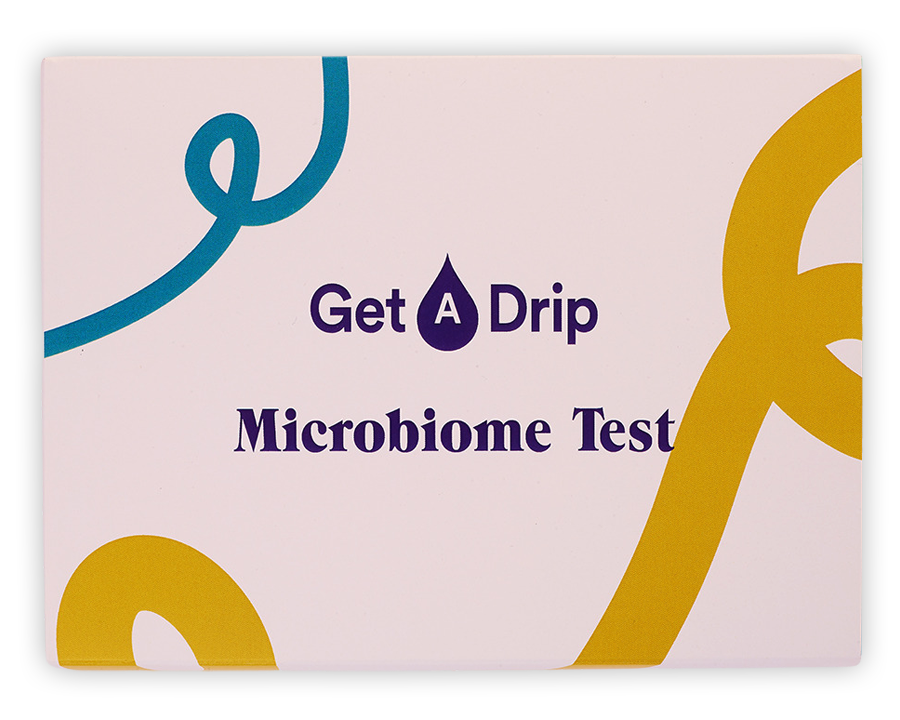- Learn how microbes protect you from disease
- Understand how diet affects gut bacteria
- Optimise microbiome vitamin synthesis
- Dietary fibre breakdown and butyrate synthesis
- Personalised food recommendations
- Probiotics and beneficial bacteria report
- Lactose and gluten metabolism
- Anti-inflammatory potential
- Free gut health consultation with a registered nutritional therapist

Notify me when back in stock!
Health
Your microbiome health score, inflammation profile, and protection from 5 disease risks.
Nutrition
Proportion of probiotics and beneficial bacteria, vitamin and butyrate synthesis potential, microbiome diversity score, lactose and gluten metabolism.
Foods
Weekly personalised food recommendations to improve your microbiome health in 17 areas.
Bacterial Composition
List of bacteria found in your microbiome (%) and what enterotype you belong to.
How Does it Work?
When you receive your kit, follow the instructions, collect your sample and send it back. We’ll do the rest, like making sure the sample is valid, analysing the DNA of your gut bacteria and interpreting the data. All you have to do is log on to your personal account to see the results.
- Collect a stool sample and send it for analysis
- We analyse the DNA of your bacteria
- Free 30 minute consultation with an expert nutritionist

Our Expert Registered Nutritional Therapist
Hi! My name’s Michael, I’m a Registered Nutritional Therapist and Osteopath and I work one on one with busy professionals, just like you, to improve troublesome digestive symptoms
Whether your life is being made miserable by IBS, gastritis or celiac disease, diarrhoea, constipation or both, bloating and gas, abdominal pain and acid reflux, food sensitivities and brain fog – I’m here to help
Working together, my job is to empower you with the knowledge to fully understand your symptoms and achieve your goals, all without having to sacrifice working, socialising or eating well.

Frequently Asked Questions
What is the Microbiome?
The microbiome is a community of bacteria that live in the gut. Nowadays, we know that over 1,000 different types of microbes are active in the human intestines. Thanks to major advances in technology, it is now possible to perform accurate analyses of the microbiome using 16S rRNA sequencing to identify these bacteria based on their DNA. In fact, the genes in the human microbiome outnumber the genes in the human body 100 to 1.
Gut bacteria are part of a big group of microbes that perform important jobs for the human body like digesting food and breaking down dietary fibre, synthesising vitamins and essential chemical compounds as well as protecting the body from inflammation. Some bacteria may participate in the development of certain illnesses but, for most species, only if they are present in abnormal amounts. When the microbiome is balanced, it is able to prevent the intrusion and overgrowth of potentially pathogenic bacteria, thus contributing to overall health
Why Should I Take a Microbiome Test?
The Atlas Microbiome Test (Ohmygut® test) analyses the types of bacteria present and their proportion in the overall microbiome. It provides information about the various functions of your gut bacteria, like the extent to which they protect you against certain diseases and inflammation, as well as what vitamins they synthesise. You will also get recommendations to improve and maintain the balance of your microbiome by adding specific foods to your diet.
Can Children Take the Atlas Microbiome Test?
No. The Atlas Microbiome Test is only for use by adults over 18 years old. The microbiome of children changes and evolves during infancy, childhood, and adolescence and this isn’t accounted for in our interpretation system, which is why our test is not suitable for children.
What’s the Difference Between this Test and Laboratory Analysis?
Atlas Biomed uses advanced technology to analyse the DNA of your gut bacteria. Unlike conventional laboratory analysis, the Atlas Microbiome Test not only qualitatively determines the composition of bacteria, but also calculates the proportion of different types of bacteria in the microbiome. The 16S rRNA sequencing technology that is used for the Atlas Microbiome Test is more sensitive: it can detect bacteria that cannot be cultivated in Petri dishes (the method routinely employed by laboratories for stool sample analysis).
How do we Know that Bacteria Affects our Health?
More than 20,000 scientific articles have been published about the gut microbiome and its relationship with various health conditions over the past decade. New research is released in this field every month. We used this extensive body of scientific evidence to develop the interpretation system for the Atlas Microbiome Test.
This research has established that bacteria in the microbiome are not simply ‘good’ or ‘bad’ species. Rather, how microbes participate in health or illness is dependent on their abundance in the overall ecosystem and how they relate to one another. The recommendations provided in your personal account have been developed on the basis of microbiome research by doctors and scientists.
Should I Follow a Special Diet Before Taking the Test?
No, you should not change your diet. Keep eating the way you normally do — this will allow us to get an accurate picture of your ‘normal’ microbiome and provide recommendations on how to improve or maintain it.
Can I do the Test if I am Sick or Taking Medication?
We recommend that you collect a stool sample in the absence of gastrointestinal symptoms. Additionally if you have been taking antibiotics, a course of NSAID’s or have undergone surgery, please wait three months before taking the Atlas Biomed Microbiome Test.
If gastrointestinal symptoms and medication are part of your every day life, you may proceed to take the test without waiting. The reason for this is because you would be providing us a sample based on your most typical microbiome.
If your symptoms and medication are only temporary and you take our Microbiome test, the results provided, as well as the food recommendations may no longer be valid once your course is completed or symptoms have cleared; this is because your microbiome can drastically change during a course of medication or bouts of illness.
How to Prepare for the Test?
You don’t have to change your diet. Keep eating the way you normally do — this will allow us to get an accurate picture of your “normal” microbiome and provide recommendations on how to improve or maintain it.
You should only collect a stool sample in the absence of gastrointestinal symptoms. If you have been taking antibiotics or a short course of NSAIDs or have undergone surgery, wait at least 3 months before taking the Atlas Microbiome Test. If the medication taken is a part of your every day life, you will be able to provide a sample as it will be based on your most typical microbiome.
I am Under 18. Can I Take the Test?
This test is intended solely for the use of persons aged 18 and over.